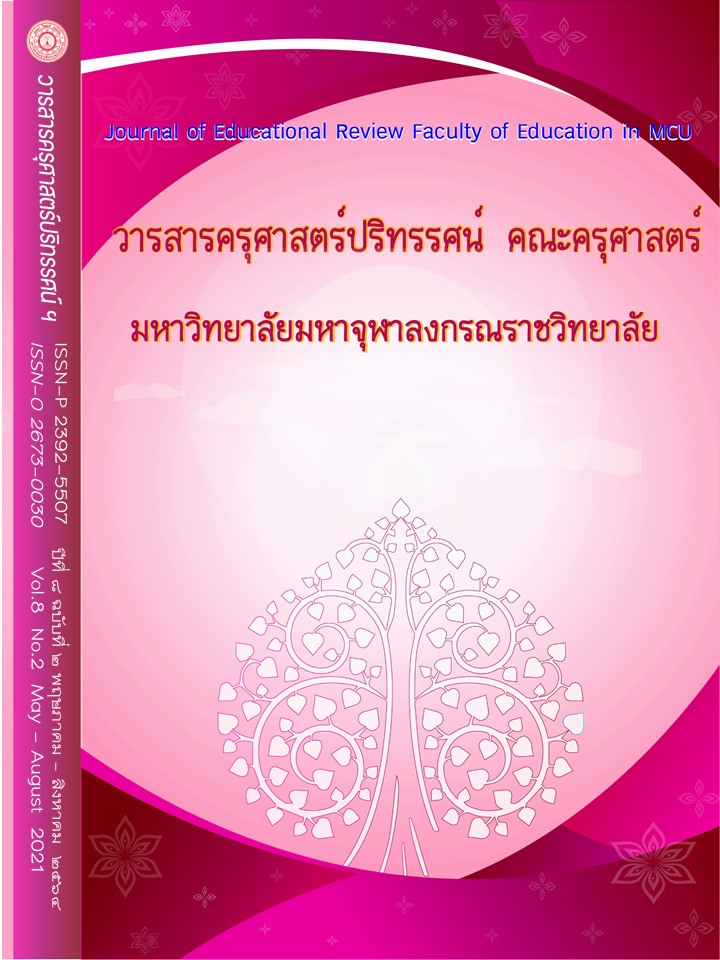MODEL OF DEVELOPMENT HAPPINESS TO AGING WIHT BUDDHIST PSYCHOLOGY IN MODERN SOCIETY
Main Article Content
Abstract
The purposes of this thesis were 1) to study the characteristics of desirable happiness for the elderly in Thai society; 2) to develop a happiness model for the elderly based on Buddhist Psychology in modern society; and 3) to present the happiness model for the elderly based on Buddhist Psychology in modern society. The study was a qualitative research in nature, using an In-depth interview to collect data from 17 key informants as specialists in Buddhism, psychology and elderly people and a focus group discussion with 9 experts. A content analysis was used for analyzing data for developing the happiness model for the elderly based on Buddhist Psychology in modern society. Findings of the study were as follows; 1) The characteristics of desirable happiness for the elderly in modern Thai society included 7 aspects: (1) having a healthy body, (2) having a clear and cheerful mind; Z3) being able to adapt to the environment well, (4) living happily with family, Z5) having sufficient financial status and expenditures, (6) benefiting the surrounding people and society according to the existing potential, and (7) being able to utilize the basic electronic media in modern society. 2) The development of a happiness model for the elderly based on Buddhist Psychology in modern society implemented by creating the elderly development process to have the seven desirable characteristics through the integration of Buddhist psychology principles including (1) building an understanding of the Buddhist nature of the Trinity that occurs, exists and disappears in accordance with the cycle of rebirth; (2) the subjective awareness to create self-happiness by having positive psychology in thinking, speaking, doing, as well as (3) creating the character of the Four Sublime State of Mind and self-developing skills of true friendship, as a training program according to the elderly character development process. 3) The happiness model for the elderly based on Buddhist Psychology in modern society was the training process of the elderly through 3-step creative activities including Step 1: The creating of knowledge and understanding in the Trinity; Step 2: The creating of subjective awareness and development for self-creating happiness for oneself; Step 3: The building of the characteristics of the Four Sublime States of Mind and the Seven True Friends to achieve the goal in creating the desired happiness of the elderly in all 7 aspects.
Article Details
ทัศนะและความคิดเห็นที่ปรากฏในบทความในวารสารฉบับนี้ถือเป็นความรับผิดชอบของผู้เขียนบทความนั้นเพียงผู้เดียว และไม่ถือเป็นทัศนะและความรับผิดชอบของกองบรรณาธิการ
กองบรรณาธิการขอสงวนสิทธิ์ในการคัดเลือกบทความลงตีพิมพ์และจะแจ้งให้เจ้าของบทความทราบหลังจากผู้ประเมินบทความตรวจอ่านบทความแล้ว
ต้นฉบับที่ได้รับการตีพิมพ์ในวารสารครุศาสตร์ปริทรรศน์ คณะครุศาสตร์ มหาวิทยาลัยมหาจุฬาลงกรณราชวิทยาลัย ถือเป็นกรรมสิทธิ์ของคณะครุศาสตร์ มหาวิทยาลัยมหาจุฬาลงกรณราชวิทยาลัย ห้ามนำข้อความทั้งหมดหรือบางส่วนไปพิมพ์ซ้ำ เว้นเสียแต่ว่าจะได้รับอนุญาตจากมหาวิทยาลัยฯ เป็นลายลักษณ์อักษร
References
กรมสุขภาพจิต. (2563). ก้าวย่างของประเทศไทย สู่‘สังคมผู้สูงอายุ’อย่างสมบูรณ์แบบ. แหล่งที่มา https://www.dmh.go.th/news-dmh/view.asp?id=30476 สืบค้นเมื่อ 20 ก.พ. 2563.
กระทรวงสาธารณสุข. (2558). แนวทางการดูแลทางด้านสังคมจิตใจของผู้สูงอายุเพื่อป้องกันปัญหาสุขภาพจิต. พิมพ์ครั้งที่ 4. กรุงเทพมหานคร: ชุมนุมสหกรณ์การเกษตรแห่งประเทศไทย.
เกสร มุ้ยจีน. (2559). การสร้างความสุขด้วยจิตวิทยาเชิงบวก. วารสารวิทยาศาสตร์และเทคโนโลยี. 24(4). 373-681.
แก้ว ชิดตะขบ, (2547). รวมวิชาธรรมศึกษาชั้นตรี (ตามหลักสูตรของสนามหลวงแผนกธรรม พ.ศ. 2546). กรุงเทพมหานคร: โรงพิมพ์การศาสนา.
คณะแพทยศาสตร์โรงพยาบาลรามาธิบดี มหาวิทยาลัยมหิดล. (2563). สภาพจิตใจของวัยผู้ใหญ่. แหล่งที่มา https://med.mahidol.ac.th/ramamental/generalknowledge/general/06272014-1009 สืบค้นเมื่อ 15 ก.พ. 2563.
นริสา วงศ์พนารักษ์. (2556). การสร้างเสริมสุขภาวะทางจิตในสังคมผู้สูงอายุ. วารสารวารสารวิจัยสาธารณสุขศาสตร์ มหาวิทยาลัยขอนแก่น. 6(2). 99.
บริบูรณ์ พรพิบูลณ์. (2528). โลกยามชราและแนวการเตรียมตัวเพื่อความสุข. เชียงใหม่: พระสิงห์การพิมพ์.
พระมหาสุทิตย์ อาภากโร ดร. (อบอุ่น) และคณะ. (2558). การเสริมสร้างสุขภาวะและการเรียนรู้ตามแนวพระพุทธศาสนา. รายงานการวิจัย. กรุงเทพมหานคร: สำนักงานกองทุนสนับสนุนการเสริมสร้างสุขภาพ (สสส.).
พิเชฐ อุดมรัตน์. (2549). สุขภาพจิตกับเศรษฐกิจพอเพียง. วารสารสมาคมจิตแพทย์แห่งประเทศไทย. 51(4). 292-297.
ภูมิวัฒน์ พรวนสุข. (2558). แนวทางการพัฒนาคุณภาพชีวิตผู้สูงอายุขององค์กรปกครองส่วนท้องถิ่นในเขตจังหวัดแพร่. วารสารบัณฑิตวิทยาลัย พิชญทรรศน์. 10(1). 77.
มหาวิทยาลัยจุฬาลงกรณราชวิทยาลัย. (2539). พระไตรปิฎกฉบับภาษาไทย ฉบับจุฬาลงกรณราชวิทยาลัย. กรุงเทพมหานคร: โรงพิมพ์มหาจุฬาลกรณราชวิทยาลัย.
สุทธิพงศ์ บุญผดุง. (2554). การพัฒนาคุณภาพชีวิตผู้สูงอายุในท้องถิ่น โดยใช้โรงเรียนเป็นฐาน ตามหลักเศรษฐกิจพอเพียง (ระยะที่ 1). รายงานการวิจัย. มหาวิทยาลัยราชภัฏส่วนสุนันทา.


